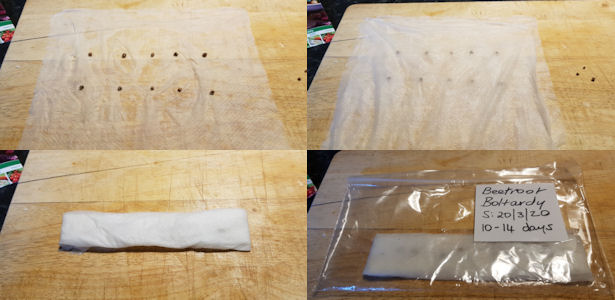Why Won't my Seeds Germinate?
Plants do everything they can to protect their seeds from germinating at the wrong time. If you can't seem to get your seeds to sprout, there may be a number of reasons why.
If you have had your seeds for a while, they might just be past their 'sprout-by' date. Before you go to all the bother of sowing a packet of seeds you've had lying around for a while, try this easy seed viability test:

I recommend you check online for the average time it should take for your seeds to germinate. Depending on the type of seed, this could be from a few days to a couple of weeks. Unroll and check your seeds for signs of sprouting every now and then. After the first seed has sprouted, wait a few more days and count the number of successful seeds. If you have 10 successfully sprouted seeds, then you can expect 100 percent germination from the rest of the seeds in the packet. If you have seven successful seeds, then it's 70 percent, and so on.
The method for checking viability above really only works for non-dormant seeds, that is, seeds that will readily germinate given a basic set of circumstances - moisture, correct temperature, air and light levels. Some plants protect their seeds a little better by ensuring they remain dormant until it's just the right time for them to wake. This prevents them from germinating if, for example, there is a warm period in late autumn which might encourage a non-dormant seed to germinate before winter.
Often dormant seeds have a hard seed coat which needs to be broken by a long period of cold before the weather warms up again. This applies to the seeds of many trees. Some seed coats are broken by fire, thus ensuring the seed germinates after a forest fire, for example, when there is space for it to grow. Some seed coats are softened by passing through the stomach of an animal, meaning the seed will be deposited with a little bit of natural fertiliser to help it on its way.

If you do have dormant seeds, you may have to break the dormancy by nicking them with a knife, putting them in the fridge for a while or soaking them overnight.
Most people know they need to cover their seeds after they've sown them but some seeds actually require light to help them germinate. Usually, these seeds are really tiny so, if your seeds are very small, try leaving them on the surface of your seed tray or seedbed without covering them up.
Julie Kilpatrick is editor of Gardenzine and author of The Plant Listener









